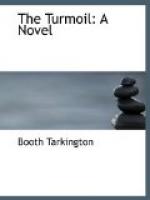“Nothing,” Roscoe answered indistinctly, not moving.
“Well, I guess that’s all right, too. I let ’em wait sometimes myself! I just wanted to ask you a question, but I expect it’ll keep, if you’re workin’ something out in your mind!”
Roscoe made no reply; and his father, who had turned to the door, paused with his hand on the knob, staring curiously at the motionless figure in the chair. Usually the son seemed pleased and eager when he came to the office. “You’re all right, ain’t you?” said Sheridan. “Not sick, are you?”
“No.”
Sheridan was puzzled; then, abruptly, he decided to ask his question. “I wanted to talk to you about that young Lamhorn,” he said. “I guess your mother thinks he’s comin’ to see Edith pretty often, and you known him longer’n any of us, so—”
“I won’t,” said Roscoe, thickly—“I won’t say a dam’ thing about him!”
Sheridan uttered an exclamation and walked quickly to a position near the window where he could see his son’s face. Roscoe’s eyes were bloodshot and vacuous; his hair was disordered, his mouth was distorted, and he was deathly pale. The father stood aghast.
“By George!” he muttered. “Roscoe!”
“My name,” said Roscoe. “Can’ help that.”
“Roscoe!” Blank astonishment was Sheridan’s first sensation. Probably nothing in the world could have more amazed his than to find Roscoe—the steady old wheel-horse—in this condition. “How’d you get this way?” he demanded. “You caught cold and took too much for it?”
For reply Roscoe laughed hoarsely. “Yeuh! Cold! I been drinkun all time, lately. Firs’ you notice it?”
“By George!” cried Sheridan. “I thought I’d smelt it on you a good deal lately, but I wouldn’t ‘a’ believed you’d take more’n was good for you. Boh! To see you like a common hog!”
Roscoe chuckled and threw out his right arm in a meaningless gesture. “Hog!” he repeated, chuckling.
“Yes, a hog!” said Sheridan, angrily. “In business hours! I don’t object to anybody’s takin’ a drink if you wants to, out o’ business hours; nor, if a man keeps his work right up to the scratch, I wouldn’t be the one to baste him if he got good an’ drunk once in two, three years, maybe. It ain’t my way. I let it alone, but I never believed in forcin’ my way on a grown-up son in moral matters. I guess I was wrong! You think them men out there are waitin’ to talk business with a drunkard? You think you can come to your office and do business drunk? By George! I wonder how often this has been happening and me not on to it! I’ll have a look over your books to-morrow, and I’ll—”
Roscoe stumbled to his feet, laughing wildly, and stood swaying, contriving to hold himself in position by clutching the back of the heavy chair in which he had been sitting.
“Hoo—hoorah!” he cried. “’S my principles, too. Be drunkard all you want to—outside business hours. Don’ for Gossake le’n’thing innerfere business hours! Business! Thassit! You’re right, father. Drink! Die! L’everything go to hell, but don’ let innerfere business!”




